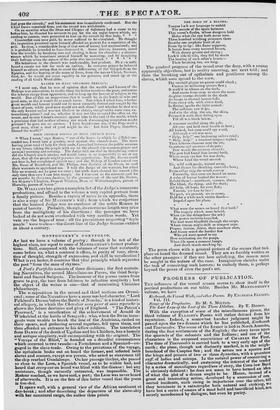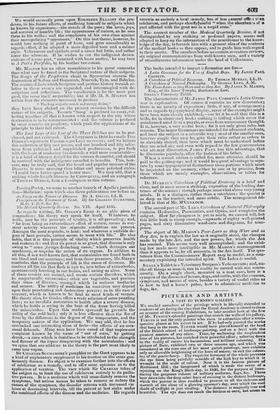PROGRESS OF PUBLICATION.
THE influence of the vernal season seems to show itself in the poetical productions on our table. Besides Mr. MONTGOMERY'S volume, we have Kerhonah, the 'ter nal It 'a, and other Poems. By EBENEZER Enniorr. Vol. III.
Sonys of the Prophecies. By M. S. MILTON. - The Last Lays of the Last of the Three Dilidins. By T. DIBDIN. With the exception of some of the miscellaneous pieces, the third volume of ELLIOTT'S Poems will rather detract from bis reputation. Indeed, a somewhat harsher judgment might be passed upon the two dramas which he has published, Kerhonah and Taurassdes. The scene of the former is laid in North America, during the first settlements of the English ; the story turns upon the quarrels of the colonists and the Indians; and one of the characters is the supposed executioner of CHARLES the First. The time of Taurussdes is carried back to a very early age of, the earth ; the place, though not distinctly marked, is in the neigh- bourhood of the Caspian Sea ; and the actors are a spectre and the kings and princes of two or three dynasties, with a (plantain suff. of ladies and satraps. In the natural power of conceiving a character dramatically, and sustaining the interest of the reader by a series of monologues regardless of story, the Corn-law Bard is obviously deficient : he does not seem to have formed an idea of what the plot of a drama ought to be. Hence, instead of a great and interesting action, developed by a succession of cofl. fleeted incidents, each rising in importance over the other, till they terminate in a catastrophe both natural and striking, we have but a series of scenes of a most bald and inartiticial kind, not merely unredeemed by dialogue, but even by poetry. We would earnestly press Upon EBENEZER ELLIOTT the pru- dence, in his future efforts, of confining himself to subjects which he knows by experience,—the annals of the poor; the loves, joys, and sorrows of humble life ; the appearances of nature, as he sees them in his walks; and the complaints of his own class against their monopolizing "oppressors." On this last theme, however, he would lose nothing in point of force, and gain considerably as regards effect, if he adopted a more dignified tone and a calmer style. Vehemence and epithets avail a cause but little, and rather lower the advocate. If be wishes to see the indignant denun. ciations of a true poet, " unmixed with baser matter, he may turn to A Poet's Portfolio, by his brother to Leman.
Mr. MILTON has no other resemblance to his great namesake than what may be found in the Scriptural nature of their subjects. The Songs of the Prophecies chant in Spenserian stanzas the destruction of Sodom and Gomorreh, Nineveh, Tyre, and Babylon. The scattered facts which Scripture and profane history furnish re- lative to those crews are expanded, and intermingled with de- scriptions and reflections. The versification is for the most part good, the verse itsslf respectable; but if Mr. M. S. MILTON has within him the elements necessary to produce " The long majestic march awl energy divine," they have been choked on the present occasion by the difficult nature of his subjects. To each "Song" is prefixed an essay, col- lecting together ell that is known with respect to the city whose destruction is to be commemorated : and the volume is prefaced by some rc made; on prophecy, which push the applications of its principle to their full extent.
The Last Lays of Me Last of The Three Dildins are to be pur- chased, and not criticized. The Clergyman in Debt has made Tom Diurnal's sojourn in Forsemeuger Lane no secret; and we believe this collection of filly new poems, and one hundred and fifty selec- tions from published and unpublished productions, is put forth with the hope of rendering his domicile a whit more comfortable— it is a kind of literary bentlit for the veteran dramatist, and should be received with the indulgence accorded to benefits. This, how- ever, may be truly said, that the broad and popular manner of the DIBDINS is more amusing than loftier and more polished styles. "I could have Letter spared a better man." We may add, that a striking whole-length likeness by CROWQUILL, and an autograph Of THOMAS DIBDIN, form a Lontispiece to this volume.
PassingPoetry, we come to another branch of Apollo's jurisdic-
tion—Medicine; upon which also three publications are before us. sle Essay on the Nature of Diseases. By A. GREEN, LL. B. Prihciples on the Treatment of Gout. By Sir CHARLES SCUDAMORE, M.D.Kit S. &c. &c.
The Medical Quarterly &ciao. NO. VII. April 1835.
As regards writing, Mr. GREEN'S Essay is an able piece of composition ; his theory may speak for itself. Whatever, he holds, may be the principle of vitality, it is all-pervading ; and, " far from being an extraordinary effort of nature, seems in con- stant activity wherever the requisite conditions are present. Amongst the most requisite, is heat; and wherever a suitable de- gree of heat prevails, nature seems to teem with life." He also holds, that it is this principle of vitality which preserves health and restores it ; and that its power is so great, that disease is only owing to " some foreign disturbiug cause," which deranges our machinery, or impedes the action of its organs. In addition to all this, it is a well-known fact, that animalcules are found both in our blood and our secretions; and from these premises, Mr. GREEN concludes that the principle of life is the cause of diseases. He resolves all the iils that flesh is heir to, into tribes of animalcules, spontaneously breeding in our bodies, and eating us alive. Some of these vermin are animal, and create certain disorders, which he conjecturally enumerates; other are vegetable, and produce their class of diseases, amongst which he reckons toothache and cancer. The utility of medicines he conceives may depend upon their penetrating and destructive powers; as in the case of mercury, which is known to be fatal to most kinds of vermin. His theory also, he thinks, offers a ready solution of some puzzling facts; as an invalid's restoration to health after a severe disease, which be holds is owing to the heat of the fever havircg killed the animalcules. Upon this modus operandi he grcunds the utility of the cold bath ; only it is less effective then the fire of fever by the difference in the degree of the temperature, and the temporary nature of the application. We may add, that he has oveilooked one interesting class of facts--the effects of' an occa- sional debauch. Many men have been cured of that unpleasant complaint known by the name of "out of sorts," by getting drunk,—a cure which is doubtless to be attributed to the strength and flavour of the liquor disagreeing with the animalcules : and we opine that our addition to the theory is the part most likely to come into vogue. Sir CHARLES Scup:mot:Les pamphlet on the Gout appears to be a kind of explanatory supplement to his treatise on she same gen- tlemanly disease. Its object is to examine further into the efftcts of colchicum as a remedy, and to offer some opinions as to the application of veratria. The view which Sir CHARLES takes of the subject is, to limit the use of colchicum entirely to its pallia- tive powers. It is a medicine which will immediately remove the Symptoms, but unless means be taken to remove or reduce the causes of the symptons, the disorder returns with increased vie lessee at decreasing intervals, till the patient at last sinks under the combined effects of the disease and the medicine. He regards veratria as entirely a local ientedy, but of less general effe e. a an colchicum, and perhaps chieftyfuseful "when the absorbents of 6 part affected with the gout are in a torpid state."
The current number of the Medical Quarterly Review, if not distinguished by any striking or profound papers, seems well adapted to keep up the information of the practitioner to the know- ledge of the day, to furnish hint with a general idea of the contents of the medical books as they appear, and to guide him with regard to their merits. The numbers before us contain seventeen reviews, six original communications from well-known ineu, and a variety of miscellaneous information under the head of Collectanca.
The books intended to impart information are five— A Latin Grammar fur the Use of English Boys. By JAMES PAUL CORBETT.
A Catechism of Political Economy. By THOMAS MURRAY, LL.D. A Catechism of Natural Philosophy. By GEORGE LEES, A. M. The Poor-Laws as they Were and as they Are. By JAMES N. Maims Esq., of the Issuer Temple, Barristenat-Law.
SMALL'S Veterinary Tablet.
The characteristic of Mr. JAMES PAUL COEBErT'S Latin Gram- mar is eaphomlion. Of course it contains no new discoverics; there is no novelty of exposition ; little, if any, of arrangement; and as regards typographical display, many of the examples might have been more clearly exhibited,—nor let it be said that this is a tulle, for in elementary books nothing is trifling which saves the uninformed mind from a puzzle, or even from unnecessary thoughts It is, however, a very useful book ; for it not only gives rules but reasons. The larger -Grammars are intended for advanced students, and treat the subject in a scientific way ; most of the smaller ones, however simple they may be, give their rules rather as orders to be slavishly obeyed, than laws which must be understood before they are acted on; and even with regard to the few grammarians who attempt illustration, JAMES PAUL has this advantage, that he illustrates popularly, after the fashion of his father.
When a second edition is called fur, more attention should be paid to the getting-up; and it would Lea great advantage to sepa- rate by sonic typographical distinctions those portions which must be imprinted on the memory, either by rote or by practice, from those which are merely examples, observations, or tables for reference.
Dr. MURRAY'S Catechism of Political Economy is a brief and clear, and in some sense a striking, exposition of the leading doc- trines of the science ; though perhaps somewhat above very young minds. It is a dialogue, rather than a catechism ; the querist is as deep as the teacher, and more subtle. The arrangement
fol- lowed is that of Mr. M`Ciseeoctr.
The second part of Mr. LEE'S Catechism of Natural Philosophy contains Hydraulics, Pneumatics, and Optics, and completes the subjoct. How far cheapness is yet to reach, we cannot tell, but this little book is cheap enough,—upwards of eighty well-printed pages, and sixty illustrative wood-cuts and diagrams, for nine- pence. The object of Mr. MAHON'S Poor-Laws as they Were and as they Are, is to explain the law as it originally stood, the changes made by the late Act, and the new powers, &c. which the Act has created. This seems very well accomplished; and the exist- big law made more intelligible in Mr. Manoe's rearrangement than it appears to be, by all accounts, in the Act itself. The quo- tations from the Commissioners' Report may be useful, as a com- mentary explaining the intended spirit. The Index is useful.
Sszase's Tablet is a Veterinary Surgeon's Vade-mecum; and, un- like all things so named, can in reality be carried with one conve- niently. On a single sheet, mounted in a neat case, here is a synopsis of the diseases of horses, dogs, and cattle, with theircauses, symptoms, and means of cure, besides a variety of useful rules as to how to feel a horse's pulse, how to administer medicine to dogs, &c.



























 Previous page
Previous page